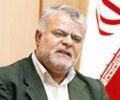
Iran will need some $40 billion this year to spur the development of oil and gas fields it shares with neighbouring countries, Oil Minister Rostam Qasemi said in his first interview
since being appointed to the post, published on Saturday.
Qasemi, a Revolutionary Guards commander, was given a vote of confidence in parliament on Wednesday, vowing to prioritise jointly owned fields, notably the giant South Pars gas reservoir in the Gulf where Qatar has leapt ahead of Iran in developing the valuable resource they share.
"In order to launch the announced development plans (on the joint fields) there is need for more than $40 billion in investment in the current (Iranian) year (ending late March 2012)," Qasemi said in an interview with Iran, a state-owned daily newspaper.
Qasemi, who formally began his new job on Saturday, joined the government after heading Khatam al-Anbia, the Revolutionary Guards' construction and engineering company, which has become increasingly active in Iran's energy sector, stepping in to replace foreign companies that pulled out due to sanctions.
While Iran might seek foreign capital to finance energy projects, it did not need foreign know-how, he said.
"There are currently very competent contractors domestically on which we can rely for the development of oil and gas can be done ... For the development of oil and gas fields we don't need foreign contractors."
One of those domestic companies is Khatam al-Anbia itself, which took over parts of the South Pars development when European firms Royal Dutch Shell and Total SA pulled out due to sanctions on Iran.
Both Khatam al-Anbia and Qasemi himself are under U.S. and European Union sanctions due to Western concerns about Iran's nuclear programme which many countries fear is aimed at developing nuclear weapons, something Tehran denies.
Qasemi said Iran would seek foreign capital, in the form of bonds, for the energy projects, as well as tapping the government's general budget, Iranian banks and domestic bonds.
"There will be a great volume of various bonds issued during the current year," he said referring to them as the "oil projects' sure financial resource."
"We will be pursuing an active diplomacy to absorb foreign capital as they form part of the required financial resources for the projects to be developed," Qasemi said.
Qasemi's figure of $40 billion for the development of shared fields is in line with the amount his predecessor, Massoud Mirkazemi, said was needed every year for the entire oil and gas sector. Mirkazemi said Iran must invest $200 billion in the period 2010-15.
Source: Reuters
We use cookies to improve your experience. By continuing to use our site, you accept our Cookies, Privacy Policy,Terms and Conditions. Close X